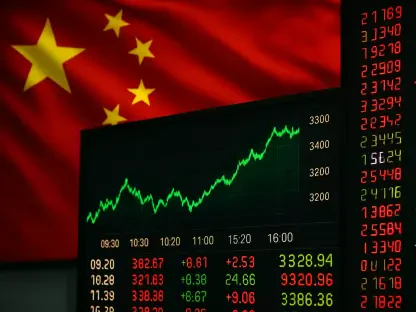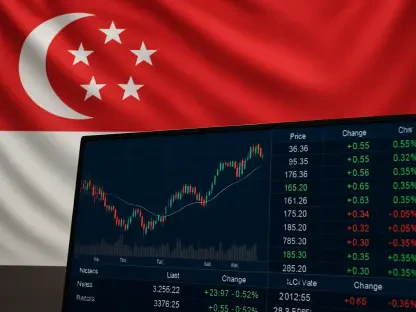What happens when a high-stakes immigration raid collides with billions of dollars in foreign investment? In Georgia, a dramatic scene unfolded as U.S. Immigration and Customs Enforcement (ICE) stormed a Hyundai battery plant, detaining over 300 South Korean workers in a spectacle that shocked global audiences. Videos of workers in shackles spread like wildfire, casting a harsh spotlight on the United States’ struggle to balance economic ambitions with hardline immigration policies. This incident isn’t just a fleeting news story—it’s a critical flashpoint that could redefine how America engages with international partners in a fiercely competitive global market.
Why This Raid Matters
The significance of the Georgia raid extends far beyond the factory gates. Hyundai’s plant represents the state’s largest economic development project, a cornerstone of President Donald Trump’s push to revitalize American manufacturing through foreign investment. South Korea alone has pledged $350 billion to U.S. projects, making it a vital ally in this economic vision. Yet, the detention of hundreds of workers has sent shockwaves through diplomatic circles, raising a pivotal question: Can the U.S. attract foreign capital while wielding aggressive enforcement tactics? This clash exposes a deeper policy fracture that threatens to undermine years of economic strategy.
The implications are stark for both nations involved. For South Korea, the raid signals unpredictability, potentially deterring future investments if visa and labor issues remain unresolved. For the U.S., it risks alienating key partners at a time when domestic manufacturing is a top priority. The incident has become a litmus test for whether economic growth and immigration control can coexist without one sabotaging the other, setting the stage for heated debates and urgent policy reevaluations.
The Collision of Two Agendas
Trump’s dual agenda of boosting manufacturing and cracking down on illegal immigration lies at the heart of this controversy. On one side, the administration has courted foreign companies with incentives like tariff exemptions, aiming to bring factories and jobs to American soil. Hyundai’s Georgia facility, a flagship project, symbolizes this ambition, promising thousands of local jobs and economic growth. South Korea’s massive investment commitment underscores the scale of what’s at stake, positioning the country as a linchpin in this industrial resurgence.
However, the immigration crackdown tells a different story. The raid on Hyundai’s plant reflects a commitment to strict enforcement, fulfilling campaign promises to prioritize border security and legal compliance. While this resonates with certain domestic audiences, it creates a hostile environment for foreign workers essential to launching these projects. The tension between welcoming investment and rejecting unauthorized labor has never been more visible, leaving companies caught in the crossfire of conflicting priorities.
This policy discord isn’t just theoretical—it’s felt on the ground. Foreign firms face operational uncertainty as they navigate a visa system that often fails to accommodate their needs for skilled temporary workers. The Hyundai incident highlights how quickly enforcement actions can escalate into international disputes, forcing a reckoning on how to align economic goals with immigration rules without losing critical allies.
Behind the Scenes of the Hyundai Operation
The raid itself was a jarring display of enforcement power, with over 300 South Korean workers detained in a highly public operation. Critics have labeled the move as performative, arguing that ICE could have conducted a discreet audit rather than a dramatic roundup. Most workers were released and sent back to South Korea, but the imagery of shackled employees fueled outrage, particularly among South Korean officials who saw it as a direct affront to their partnership with the U.S.
Digging deeper, the root causes point to systemic failures. The U.S. visa framework, riddled with caps and lotteries, struggles to support the influx of skilled workers needed for projects like Hyundai’s. Companies often find themselves in legal gray areas, unable to secure timely approvals for essential staff. This bureaucratic bottleneck, combined with the urgency to meet project deadlines, creates a perfect storm where enforcement clashes with economic necessity.
The fallout has been immediate and far-reaching. South Korean President Lee Jae-myung publicly cautioned that such unpredictability could dampen future investments, a warning that carries weight given the $350 billion already on the table. The incident has amplified calls for reform, exposing how enforcement zeal can ripple outward, damaging trust and economic ties in ways that are hard to repair.
Voices from the Frontlines
Reactions to the raid have been swift and varied, painting a complex picture of frustration and urgency. Immigration expert Dan Kowalski didn’t mince words, calling the operation “100% performative” and a missed opportunity for a less confrontational approach. His critique reflects a broader sentiment that enforcement should focus on solutions rather than spectacles, a view shared by many in policy circles.
Academic Ben Armstrong from MIT offered historical context, pointing out that Japanese and German automakers have long relied on temporary foreign specialists to set up U.S. plants without facing such dramatic backlash. Meanwhile, South Korean leaders expressed dismay over visa barriers, with President Lee Jae-myung urging streamlined processes. On the U.S. side, White House spokeswoman Abigail Jackson defended the raid as a necessary enforcement measure, though tempered by Trump’s assurances of exploring legal pathways for foreign workers.
Diplomatic efforts are already underway to mend the rift. Secretary of State Marco Rubio has engaged in talks with South Korean counterparts, signaling a mutual desire to prevent further erosion of trust. These discussions, alongside expert insights, underscore a pressing need to bridge the gap between immigration policy and economic strategy before more damage unfolds.
Charting a Path Forward
Finding harmony between economic ambitions and immigration enforcement demands pragmatic solutions. Visa reform stands as a critical first step—experts suggest creating a specialized category for temporary skilled workers, akin to arrangements with countries like Mexico or Australia. Such a move could provide clarity and stability for companies like Hyundai, ensuring they can bring in essential staff without fear of legal repercussions.
Enforcement tactics also need a rethink. Shifting from high-profile raids to routine audits would maintain compliance without the public relations fallout that alienates international partners. Additionally, stronger diplomatic engagement with allies like South Korea is essential, with ongoing talks needing firm timelines and commitments to reassure investors of the U.S. as a reliable destination.
Transparency in policy communication rounds out the necessary measures. Foreign companies require clear, consistent guidelines on legal workforce pathways to plan effectively. These steps, informed by expert analysis, offer a blueprint to reconcile Trump’s objectives, safeguarding both economic growth and security priorities. The challenge lies in swift implementation to prevent further erosion of confidence among global investors.
Reflecting on a Defining Moment
Looking back, the Hyundai raid in Georgia stood as a stark reminder of the delicate balance between national security and economic progress. It exposed raw tensions within policy frameworks, strained alliances with key partners like South Korea, and ignited a fierce debate over how to welcome investment without compromising enforcement. The detentions, though resolved quickly for most, left an indelible mark on perceptions of the U.S. as a business-friendly environment.
The path ahead hinges on actionable reforms and renewed trust. Policymakers face the task of overhauling visa systems to better support temporary skilled workers, while enforcement agencies must adopt subtler, less disruptive methods. Diplomatic channels offer hope, with commitments to dialogue paving the way for potential solutions. Ultimately, the resolution of this conflict promises to shape not just U.S.-South Korea relations, but the broader landscape of foreign investment in America for years to come.









